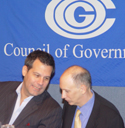 At the Metropolitan Washington Council of Governments (COG) 2004 Annual Meeting, economic development expert Richard Florida told an audience of regional elected officials and specials guests that the future of the National Capital Region depends on attracting and retaining the most diverse population of workers possible.
At the Metropolitan Washington Council of Governments (COG) 2004 Annual Meeting, economic development expert Richard Florida told an audience of regional elected officials and specials guests that the future of the National Capital Region depends on attracting and retaining the most diverse population of workers possible.
 “A region that is as aggressively inclusive and tolerant as it can be—of people from different age groups, genders, races, cultures, incomes, and sexual orientations—will get an edge,” said Florida, best-selling author of The Rise of the Creative Class and professor at George Mason University in the School of Public Policy.
“A region that is as aggressively inclusive and tolerant as it can be—of people from different age groups, genders, races, cultures, incomes, and sexual orientations—will get an edge,” said Florida, best-selling author of The Rise of the Creative Class and professor at George Mason University in the School of Public Policy.
His research points to a great change occurring today in economic development where creative, young workers move to regions based on the perception of their social benefits, such as diversity, cultural attractions, and energy, rather than job opportunities alone. He believes that Washington is the nation’s preeminent region for economic development because its diversity appeals to the greatest number of potential workers.
“The average American worker stays at his or her job less than three years, and people under 30 for less than a year,” said Florida. He says metropolitan Washington has attracted the largest number of workers who form the “creative class” of people from fields as diverse as technology, science and the arts who create for a living. Florida also stressed the importance of affordable housing and availability to transit if the region wishes to retain these workers.
 “I was pleased to hear Dr. Florida acknowledge the need to maintain our world-class Metro system and strengthen affordable housing initiatives,” said COG Executive Director David Robertson. “Both are critical links to our region’s economic development.”
“I was pleased to hear Dr. Florida acknowledge the need to maintain our world-class Metro system and strengthen affordable housing initiatives,” said COG Executive Director David Robertson. “Both are critical links to our region’s economic development.”